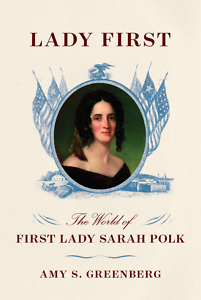Wielding Power Softly
Amy Greenberg’s new biography calls Sarah Polk the ‘First Lady who was a lady first’
Amy S. Greenberg’s intriguing theme in Lady First, her biography of Tennessee’s Sarah Childress Polk, is that the wife of President James K. Polk was a political force in the 1840s because she was so good at seeming not to be.
 This powerful “First Lady who was a lady first” presented herself as merely a dutiful helpmate at a time when it was a compliment to call her “a sweet exemplification of lowliness,” as one magazine did. In reality, as Greenberg documents, Sarah was a proactive impresario of James’s political career, his “communications director” and most trusted adviser, and the manager of strategic salons, dinners, and friendships that helped her disagreeable husband flourish in Washington. “By 1848, Mrs. Polk had perfected the ability to hide her power in plain sight under the mantle of female deference,” Greenberg writes in a preface—a “model of conservative female power” that has been adapted to contemporary times by such figures as Nancy Reagan and Ivanka Trump.
This powerful “First Lady who was a lady first” presented herself as merely a dutiful helpmate at a time when it was a compliment to call her “a sweet exemplification of lowliness,” as one magazine did. In reality, as Greenberg documents, Sarah was a proactive impresario of James’s political career, his “communications director” and most trusted adviser, and the manager of strategic salons, dinners, and friendships that helped her disagreeable husband flourish in Washington. “By 1848, Mrs. Polk had perfected the ability to hide her power in plain sight under the mantle of female deference,” Greenberg writes in a preface—a “model of conservative female power” that has been adapted to contemporary times by such figures as Nancy Reagan and Ivanka Trump.
The author, who has written about Manifest Destiny and the Polk administration in other histories, including A Wicked War and Manifest Manhood, creates a vivid and absorbing picture of nineteenth-century domestic life among the well-to-do planter and political families of Middle Tennessee, and of Sarah’s time in the White House. The book is meticulously researched, but facts about, say, the forty sheep and three hundred pounds of ham that fed thousands at a Murfreesboro political picnic, or a single order of Paris dresses for First Lady Polk that cost today’s equivalent of $12,600, give the story ballast without interrupting its flow.
The Polks enjoyed a congenial, fluid lifestyle made possible only because of slave labor, as Greenberg regularly reminds us. Sarah Childress’s dowry—when she left her family’s cotton farm near Murfreesboro to marry James K. Polk of Columbia—included ten enslaved people. She and her brother worked behind-the-scenes to buy slaves for James’s Mississippi Delta plantation while he was president, and she became the owner of fifty-six enslaved workers there when James died.
While Greenberg confronts how readily the wealthy in cotton-growing states made such cruel compromises, Sarah Polk nevertheless emerges in Lady First as an admired public figure and a graceful manipulator of the political landscape she inhabited. She didn’t drink and banned dancing in the White House, and she was a strict observer of the Christian Sabbath, but she was fluent in the kind of conversation that made Washington dinners and social receptions work. Her tireless support as an informed hostess may have been the main source of oxygen for Polk’s career in Congress and the White House, for he had a “profound and sustained lack of humor,” according to Greenberg.
 Sarah was a natural politician in an era when women couldn’t even vote. After James left his seat in Congress to serve as governor of Tennessee, Supreme Court Justice John Catron wrote to Sarah: “I miss you more here than any person living, and profit more by your information in regard to most things.” Greenberg makes a case that the liveliest discourse during James’s presidency was probably conducted without him, among his wife and her political correspondents.
Sarah was a natural politician in an era when women couldn’t even vote. After James left his seat in Congress to serve as governor of Tennessee, Supreme Court Justice John Catron wrote to Sarah: “I miss you more here than any person living, and profit more by your information in regard to most things.” Greenberg makes a case that the liveliest discourse during James’s presidency was probably conducted without him, among his wife and her political correspondents.
As an avatar of feminist power, the first lady wasn’t an easy fit. She was an Andrew Jackson Democrat who expressed no interest in the history-making women’s-rights convention held in Seneca Falls the last year of her husband’s presidency, but she had this confident response to the speculation that Henry Clay’s wife would make a better first lady because she was good at housekeeping and butter-making: “If I should be so fortunate as to reach the White House, I expect to live on twenty-five thousand a year, and I will neither keep house nor make butter.”
The Polks’ determination—and it was a joint project, Greenberg asserts—to extend the United States into the Republic of Texas and the Oregon Territory ensured James’s presidential election in 1844, and 800,000 square miles were added to the U.S. during his time in office. The march westward, glorified by the term “Manifest Destiny,” made the slave-holding Polks even richer; the value of their human property shot up after the war with Mexico sealed the U.S. land grab. While James maintained through friends that he purchased slaves only to keep families together, “his purchases were of a sort that would particularly horrify the public” if they had been revealed, Greenberg writes.
James died in 1849, the year after his term as president ended, and Sarah remained an object of public affection through her forty years of widowhood. She weathered the chaos of Union-occupied Nashville during the Civil War, keeping house at the (now razed) Polk Place within sight of the state capitol, negotiating pardons for family and friends and favors for herself from Presidents Abraham Lincoln and Andrew Johnson. It was her skillful deployment of deference to men that gave her power, Greenberg writes, and this biography lifts Sarah Polk from the obscurity to which her deference had consigned her.
[This article originally appeared on February 20, 2019.]

Peggy Burch was books editor at The Commercial Appeal in Memphis for ten years, and she also worked as a deputy metro editor and Arts & Entertainment editor for the newspaper. She is a graduate of the Newhouse School of Public Communications at Syracuse University and holds a master’s degree in English literature from the University of Mississippi.


